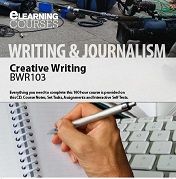
Develop skills to write dramas for TV, radio, books etc.
- Learn to write drama, and stimulate the readers emotions.
- Learn more about the mechanics of writing.
- Develop your capacity to communicate more clearly and effectively.
- Explore opportunities to turn your passion into a rewarding job.
This course is suitable for absolute beginners or people who wish to improve their dramatic writing skills.
What is Dramatic Writing?
Drama is the term usually used to describe a specific type of fiction that is represented via performance. It comes from the Greek word for action. So although theatrical drama is intended to be performed by actors for an audience, dramas are also written to be read.
- Do you have story ideas but don't know where to start?
- Do you want to create plots that are engaging and interesting to read?
- Do you want the opportunity to have your work published in the student newsletter?
Then this is the course for you, enrol now!
Lesson Structure
There are 8 lessons in this course:
-
Introduction
-
Motivation
-
Typing Time
-
Types of Writing - Reflection, Exposition, Description, Explanation, Argument
-
Making Decisions about what to Write
-
Know your stuff
-
The concept
-
Synopsis
-
Keeping a Notebook
-
Process of Story Development
-
Planning a Story
-
Developing your Voice
-
Useful terms
-
Characters
-
Developing the characters
-
Building Characters
-
Main Characters
-
Minor Characters
-
Theme & Genre
-
Developing a Theme
-
Universal Themes
-
Sub Themes
-
Creating Conflict
-
Names
-
Plot Development
-
First Decisions
-
Ambience
-
The End of a Story
-
Types of Dramatic Story: Memoirs, Biographies, Reflective Stories, Historical etc
-
Weaving a Story
-
Techniques: Action, Emotion, Mirror; Parallel lives, Palm Cards
-
Writers Block
-
Developing a Story Line
-
Things to Avoid
-
Different Approaches: Dialectic, Transition
-
How a Character Affects a Plot
-
How Plot Affects Genre
-
Goals
-
Consequences
-
Motive
-
Flashbacks and Flashforwards
-
Writing a Dramatic Short Story
-
Main Character and Antagonist
-
Creating a Sense of Place
-
Counting Out Your Story
-
Short Stories
-
Developing Sub Plots
-
Writing a Chapters for a Dramatic Work (Novel or Play)
-
Getting Published
-
Writing Resources
-
Writing as a Business
-
Vanity Publishing
-
Dealing with Publishers
-
Creating a Chapter or Segment of a larger work
Aims
-
Define and develop an understanding of dramatic writing.
-
Develop methods of developing characters in dramatic writing.
-
Define different genres and develop themes for dramatic writing.
-
Develop techniques for developing your plot.
-
Describe techniques for weaving a story.
-
Develop a short story using dramatic writing.
-
Develop a chapter of dramatic writing.
-
Determine how to develop sub plots.

TAKE THE NEXT STEP AND ENROL NOW!
Would you like to write dramatic stories for film, TV, radio, video or books?
Do you want to improve your dramatic writing skills?
What are you waiting for? Enrol today and start writing great dramas.
You can enrol on the course now, but if you have any questions about the content of the course or studying with ACS, then please get in touch with us today - use our FREE COURSE COUNSELLING SERVICE to get in touch with our expert tutors. They will be pleased to help you!
